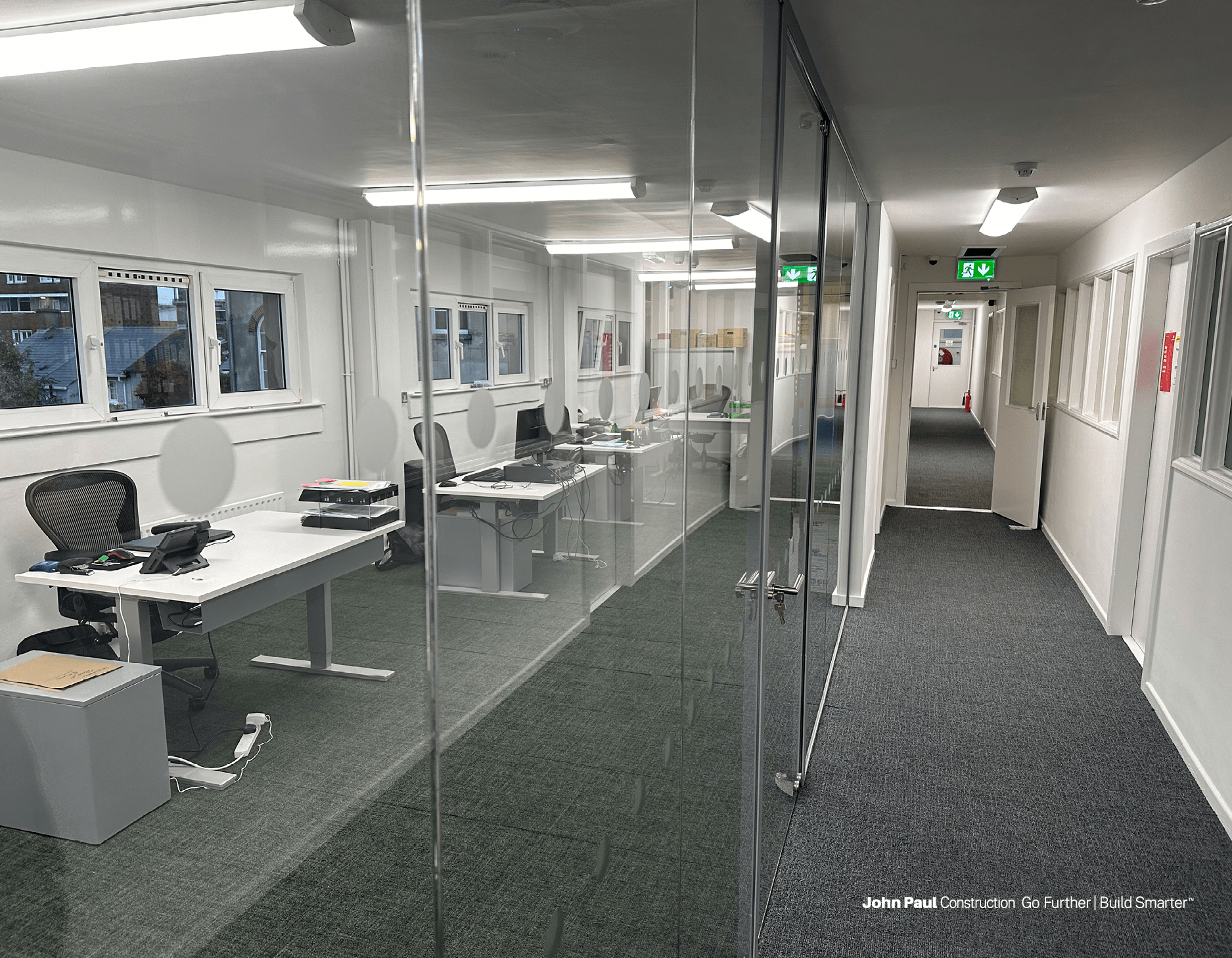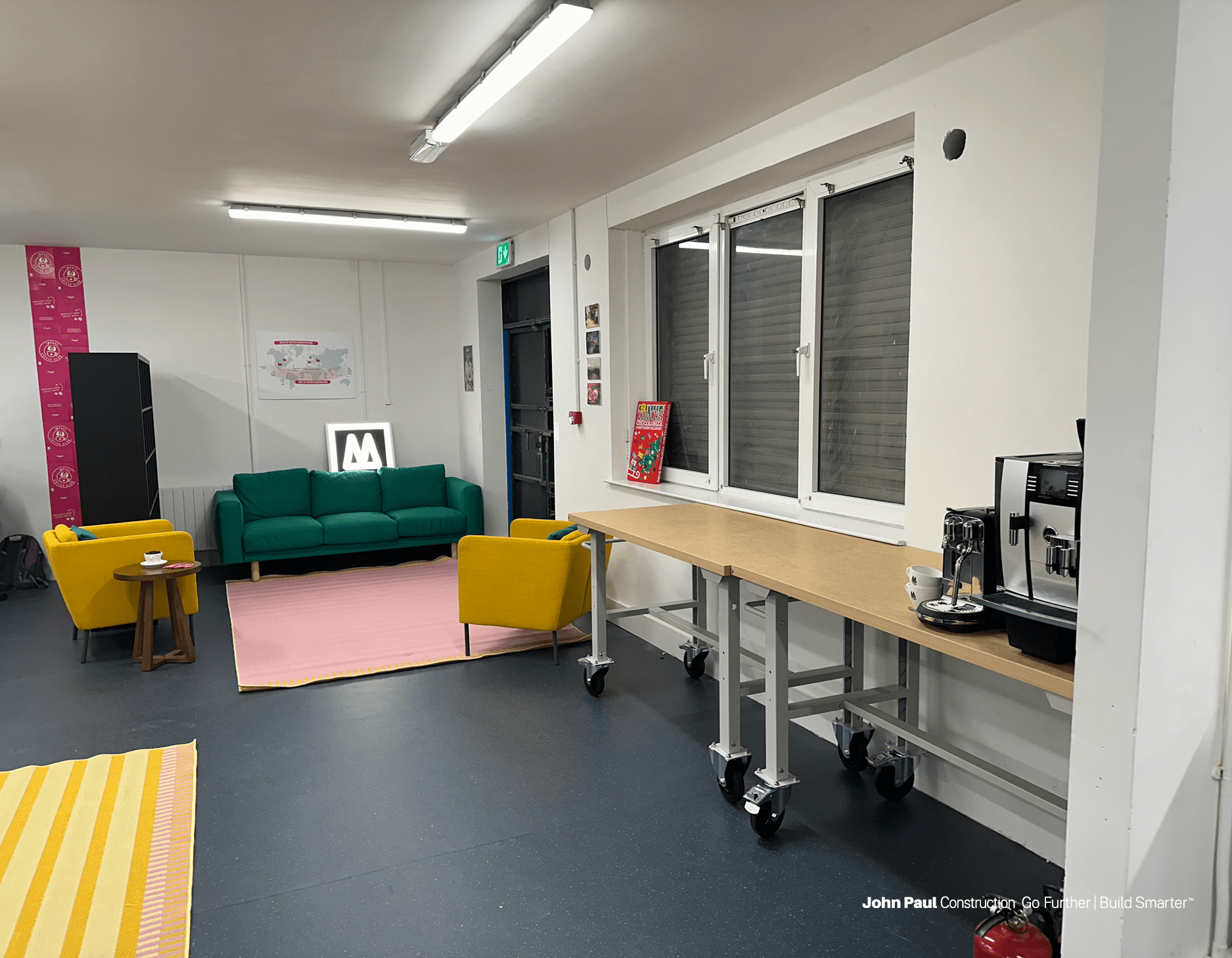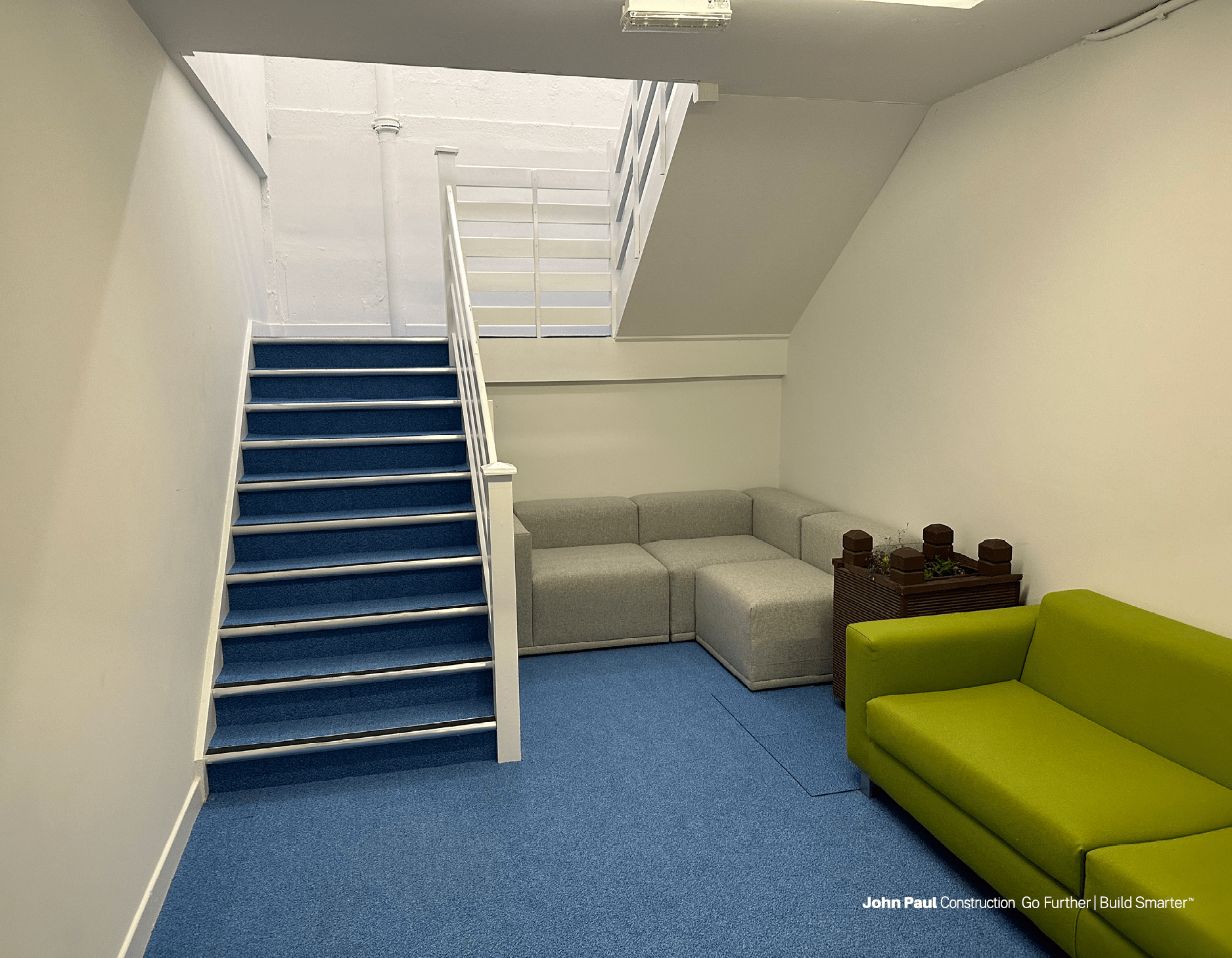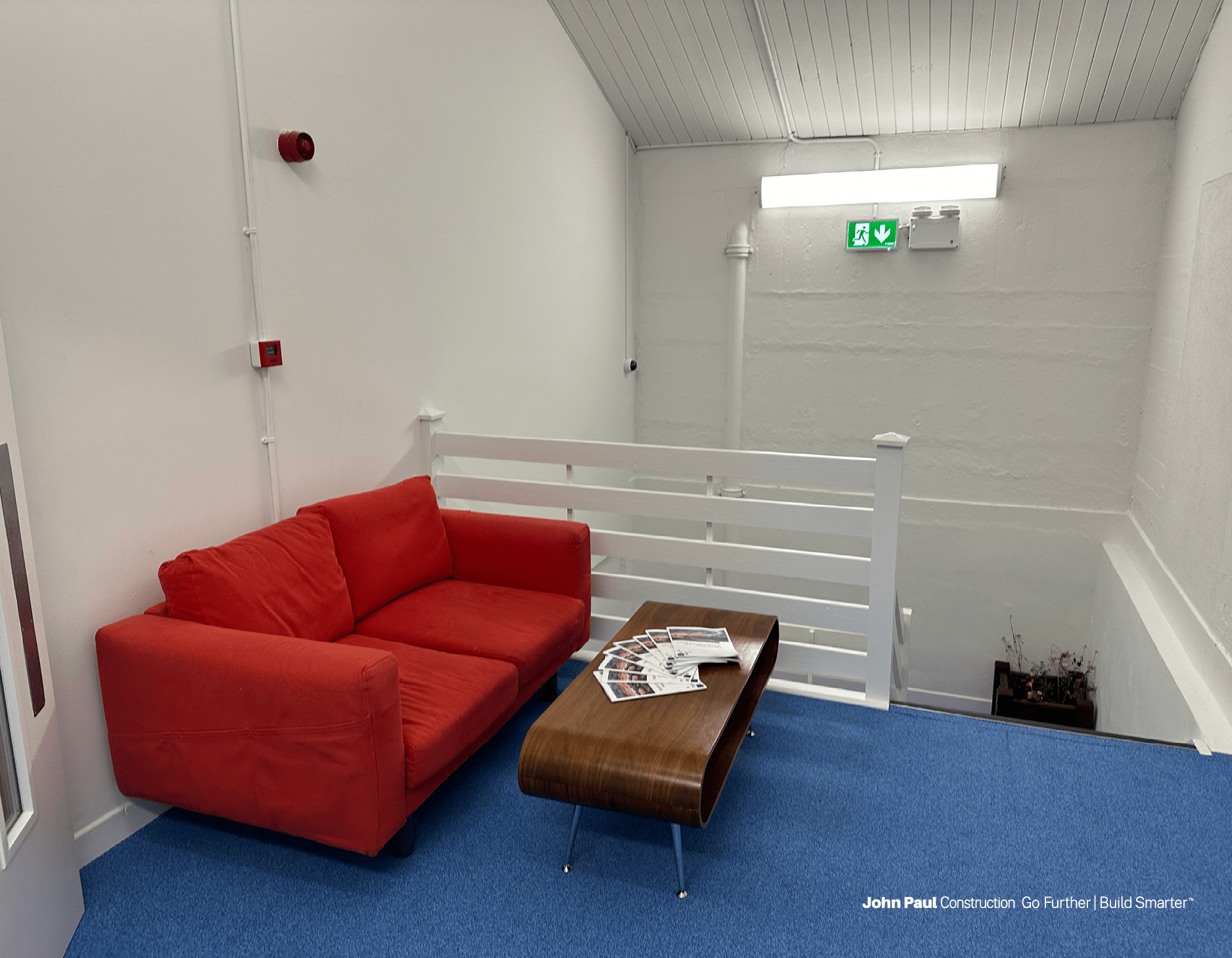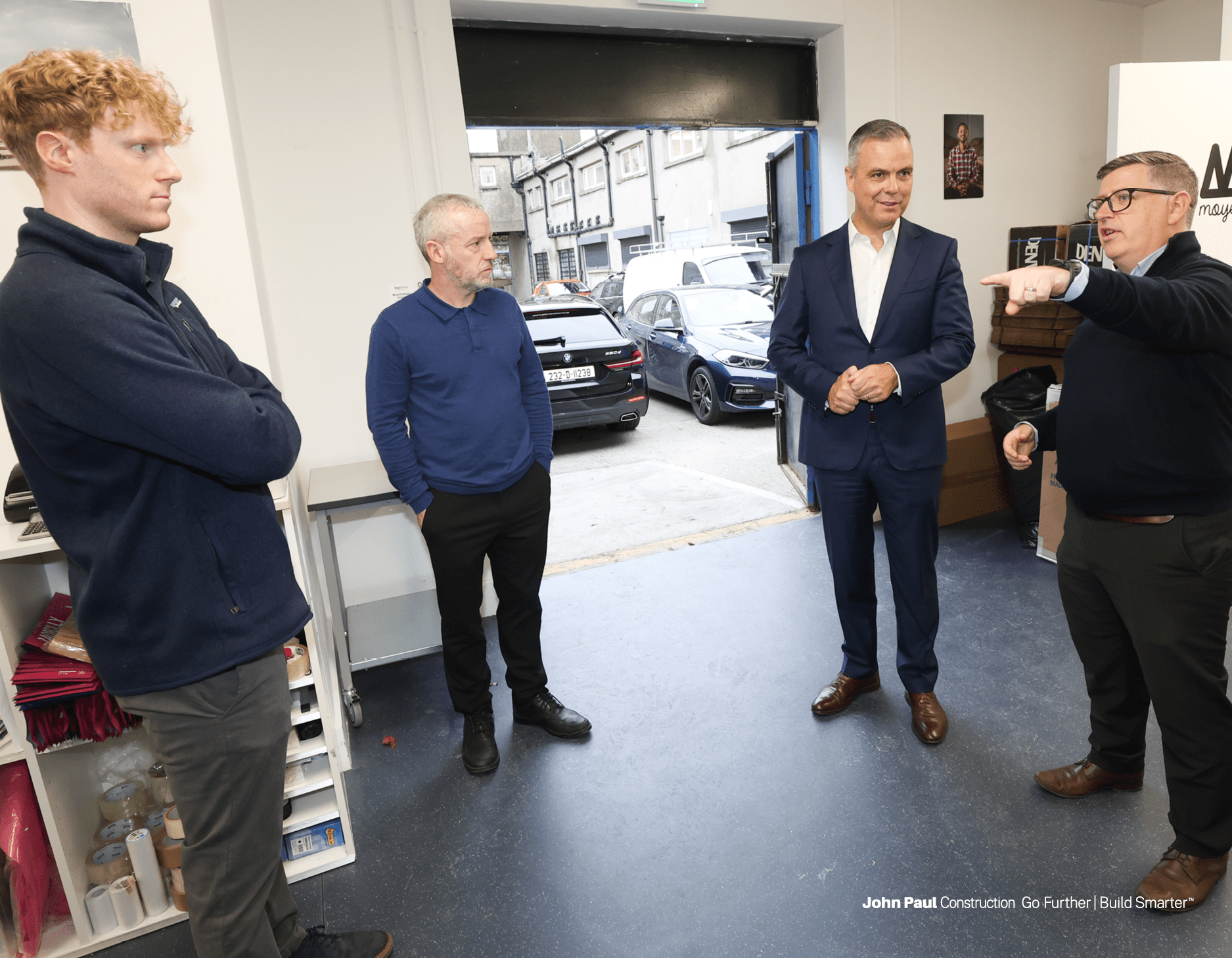Inner City Enterprises
The smile on Evanne Kilmurray’s face says it all. Kilmurray, CEO of Inner City Enterprises (ICE), is “just delighted” with ICE’s newly renovated HQ in Dublin’s north inner city. And she’s not alone. Chatting to the people who use the hub, it’s clear that the micro businesses, social enterprises and young entrepreneurs operating from the refurbished incubation space are just as pleased.
John Paul Construction developed a phased plan (Phases 1, 2 and 3) to renovate the approx 900-sq-metre building, with each phase further divided into two (a and b). Phases 1a and 2a have just been completed, and what was a vast, neglected former housing depot for Dublin City Council is now smarter, brighter and buzzing with energy. The increased footprint and radically improved facilities will mean that ICE can offer more people than ever before the advice, supports, training and networking opportunities they need to start or grow their business. Kilmurray and her team are confident it will make a huge impact. “It’s a real game-changer for us,” she says, “John Paul Construction — in fact, everyone who contributed — has been brilliant. They’ve made every cent count.”
Like many of the best collaborations, this one began with a casual conversation. Chatting to ICE’s chairman at an event earlier this year, Liam Kenny, Managing Director of John Paul Construction, was intrigued not just by the work of the inner-city non-profit, but by their ambition and vision. So when, a few short weeks later, he got a call asking if John Paul could help out in any way with the renovation of its new Dublin HQ, freshly secured from Dublin City Council, he said yes straight away.
Within weeks, a team led by Gary Howard, Associate Director, was in place and together with ICE’s architect, Peter Kavanagh, they began to map out the available space on the site, which is located on Coleraine Street, next to King’s Inn Park, right on the border between Dublin 7 and Dublin 1.
With such a large footprint to cover, it soon became clear that the very limited budget of approx €160k wasn’t going to stretch to completing the whole building in one go. “We realised pretty quickly that the best thing was to do the work in phases,” explains Gary. “That way ICE can get the facilities up and running but also have the time they need to secure extra funding, to finish it in its entirety.”
Kilmurray saw the common sense of Gary’s plan straight off. “Phasing is our only option if we’re to help more businesses now. They can’t afford to wait, and having discussed it with the board, we agreed to put all the existing budget into Phases 1a and 2a. We’re just thrilled with the result.”
You can see why. Gleaming paintwork, new flooring and overhauled electrical, heating and safety systems radically improve both the appearance and functioning of the building, while on the upper floor, a generous glass partition brings light into the central corridor. What was a warren of dark, small rooms has been transformed into a series of bright office spaces and units of varying configurations, designed to meet the diverse needs of the fledgling businesses who use it as a base, including fair-trade coffee company Moyfee Coffee, the charity Parentline and ICE itself, which is a non-profit.
“It’s been a privilege for our team to work on this”, says Gary. “ICE’s work is a cause close to my heart and is something John Paul really believes in. You hear negativity about this part of the north inner city, but the community here is fantastic, and these businesses are rooted in that community. ICE helps them make a real go of it.”
A smiling David Mulreid, Project Manager on the renovation, clearly shares his enthusiasm. Like Gary, David is quick to credit not just the ICE team for their co-operation on the renovation, but the many suppliers and sub-contractors who donated to it in some form, whether in time or materials, including flooring, paint, carpeting, or in key consultant services like asbestos removal. “Our network has been just brilliant. We didn’t even have to lean on them too hard!” jokes David.
John Paul’s management donated their time on a pro bono basis from April until the initial phases were complete and the building opened for business. Having shown that the limited budget wasn’t going to cover the true cost of the planned works, they developed a secondary cost plan which factored in an alternative scope and identified potential pro bono offerings from John Paul’s extensive supply chain, many of which the company has been working with for years. To make sure costs didn’t increase — not easy in a time of rising inflation — a crew from John Paul visited the site each week to monitor progress, and engaged regularly with the supply chain to get the very best deals. And it paid off. “They really stepped up,” says Gary. “Some absorbed the labour costs and others provided materials on a net-cost basis. To be fair, they’ve been amazing.”
The result of all this combined effort is that ICE’s limited budget has been stretched as far as possible on materials and workmanship. Nothing has been wasted. There’s a significant legacy effect too, as the John Paul team has laid the groundwork for subsequent phases with a clear cost plan for Phases 1b, 2b and 3 as well as for externals, which ICE can use once they receive further external funding.
For ICE, at least for the moment, the focus is on the present — on getting more local businesses and ‘solopreneurs’ to use the facility and take advantage of the wide array of services ICE offers, from mentoring to workshops and business plans. As Kilmurray says: “ICE’s slogan is ‘We give life to your business idea.’ This hub will let us give life to so many more. It really is the start of a new chapter.”

